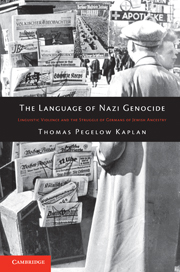Book contents
- Frontmatter
- Contents
- Illustrations
- Acknowledgments
- Abbreviations
- Introduction
- 1 “We Are All Germans; Why Then Ask for Religion?”: Cultural Identity, Language, and Weimar Pluralism, 1928–1932
- 2 “Racial and Social Boundaries between Germans and Jews Are to Be Strictly Drawn”: Dictatorship Building and the Process of Nazifying Language, 1933
- 3 Toward the Eradication of the “Impossible, Untenable Category of ‘German Jews’”: Enforcing and Contesting Racial Difference, 1935–1938
- 4 “The Jewess” Attempted to “Stage a Case on Her Descent”: Linguistic Violence as Part of Genocide, 1941–1945
- 5 “We Are Not Bad Jews, Because We Believe We Are Good and True Germans”: Another Beginning and Persisting Difference, 1945–1948
- Conclusion
- Appendix: Frequency of Key Categories of Germanness and Jewishness
- Bibliography
- Bibliographical Essay
- Index
- References
3 - Toward the Eradication of the “Impossible, Untenable Category of ‘German Jews’”: Enforcing and Contesting Racial Difference, 1935–1938
- Frontmatter
- Contents
- Illustrations
- Acknowledgments
- Abbreviations
- Introduction
- 1 “We Are All Germans; Why Then Ask for Religion?”: Cultural Identity, Language, and Weimar Pluralism, 1928–1932
- 2 “Racial and Social Boundaries between Germans and Jews Are to Be Strictly Drawn”: Dictatorship Building and the Process of Nazifying Language, 1933
- 3 Toward the Eradication of the “Impossible, Untenable Category of ‘German Jews’”: Enforcing and Contesting Racial Difference, 1935–1938
- 4 “The Jewess” Attempted to “Stage a Case on Her Descent”: Linguistic Violence as Part of Genocide, 1941–1945
- 5 “We Are Not Bad Jews, Because We Believe We Are Good and True Germans”: Another Beginning and Persisting Difference, 1945–1948
- Conclusion
- Appendix: Frequency of Key Categories of Germanness and Jewishness
- Bibliography
- Bibliographical Essay
- Index
- References
Summary
Within less than two years of the beginning of Hitler's chancellorship, the Nazi dictatorship was firmly in place. The March 1933 Enabling Law allowed the Hitler-led cabinet to pass laws without the involvement of the Reichstag. By July 1933, the Nazis had turned Germany into a one-party state. After the death of Reich President von Hindenburg in August 1934, Hitler swiftly usurped the president's office and became head of state. During the previous month, he had appeased the Reichswehr by decapitating the paramilitary SA whose growing influence the Nazi leader had also regarded as a threat to his own power. After the execution of Ernst Röhm and other SA leaders, the organization's new Chief of Staff Viktor Lutze oversaw a reduction in size and influence. What was more, the reintroduction of compulsory military service in March 1935 further strengthened Hitler's standing among the troops and enhanced his growing support by the German people.
Based on this immense political power and growing popular consensus, the party leadership and gradually Nazified ministerial bureaucracy proceeded with their projects of racial separation and the remaking of the language of Germanness and Jewishness. However, the 1933 legislation did not provide conceptual precision or even explicit definitions of Jewishness. As the previous chapter has shown, these laws contained unclear boundaries and contradictory definitions to describe non-Aryanness, which the nation's press then disseminated among the broader population. Despite these inconsistencies, the laws had a direct impact on everyday life in the Hitler state.
- Type
- Chapter
- Information
- The Language of Nazi GenocideLinguistic Violence and the Struggle of Germans of Jewish Ancestry, pp. 102 - 159Publisher: Cambridge University PressPrint publication year: 2009



